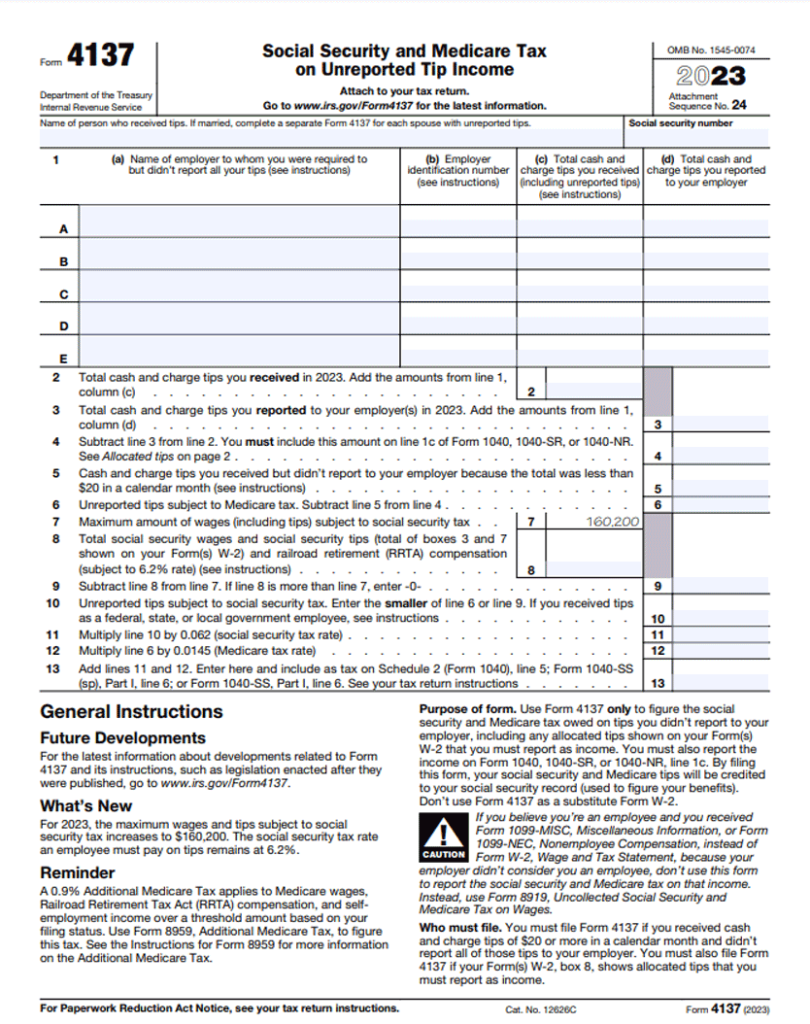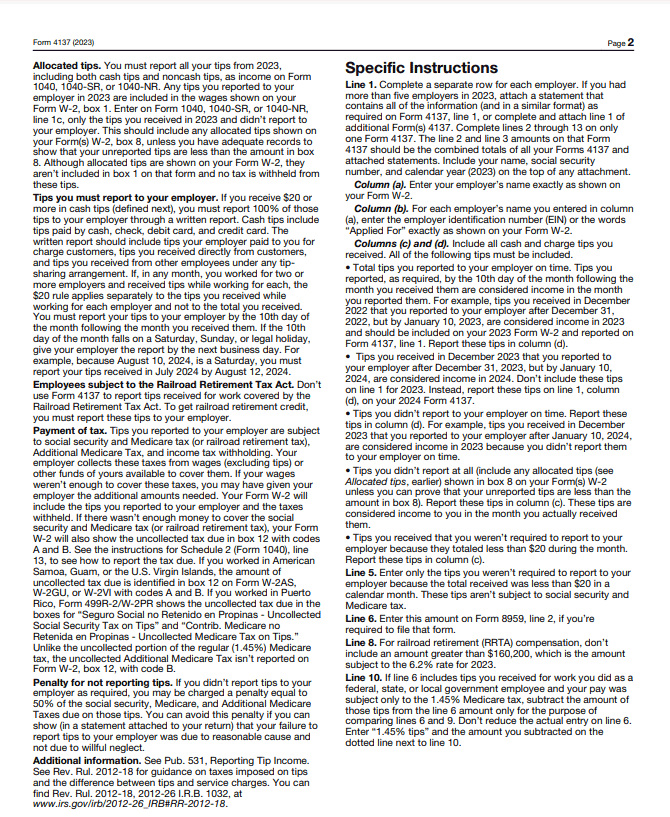Introduction
Form 4137, “Tax on Unreported Tip Income,” is crucial when you earn tips that go unreported to the IRS. You should use this form if you work in an occupation where receiving tips is common, such as in the service or hospitality industry.
It’s essential you are aware that tips, whether it’s in cash or added to credit card payments, constitute taxable income. If you haven’t reported these tips to your employer or on your tax return, you’re obligated to disclose and pay taxes on this income.
Form 4137 helps you calculate the Social Security, Medicare, and income taxes you owe on unreported tip income. By accurately completing this form, you ensure compliance with IRS regulations and avoid potential penalties or audits. Remember, reporting your income correctly, including tips, is a crucial part of fulfilling your tax obligations.
When to Use Form 4137: Tax on Unreported Tip Income
1. Form 4137 Purpose
2. Taxable Tip Definition
3. Service Industry Obligation
4. Unreported Tip Income
5. Calculation Process
6. How to File
7. Tax Implications
Recap
1. Form 4137 Purpose


Form 4137 serves as a comprehensive tool specifically designed to handle unreported tip income. It allows you to accurately calculate and report your Social Security, Medicare, and income taxes on tip earnings you have not disclosed to the IRS.
This form is vital in ensuring compliance with tax regulations, especially if you work in the service industry where tips are common. By using Form 4137, you fulfill your responsibility to report these earnings accurately, avoiding potential penalties or audits.
Its purpose is to help individuals like you, in such professions, meet your tax obligations by providing you with a structured way to calculate and include unreported tip income in your tax return. This form ensures fairness in taxation, maintaining transparency in income reporting, and helps you prevent underpayment of taxes related to unreported tips.
2. Taxable Tip Definition
Taxable tips refer to any additional compensation you receive beyond your regular wage or salary for services you render, which can include cash, credit card tips, or even non-monetary items of value. These earnings are subject to taxation because it constitutes income, just like your hourly pay.
It’s crucial you note that tips you receive in the course of your work, such as in the service industry, are generally considered as taxable income. Any amount you receive directly or indirectly from customers that exceeds $20 in a calendar month automatically qualifies as taxable. This includes tips added to your credit card payments.
Even occasional or irregular tips count as taxable income and you should report it to the IRS. Make sure you understand what qualifies as taxable tips so you can accurately report your income and ensure compliance with tax regulations.
3. Service Industry Obligation
In the service industry, it’s your responsibility to accurately report all tips you receive while performing your job. Whether you’re a waiter, bartender, hair stylist, or in any occupation where tipping is customary, you’re obligated to report these earnings to the IRS.
Your role involves keeping track of all tips you receive, including cash, credit card, or any other form of gratuity from customers. It’s essential you maintain accurate records of your tips to avoid potential discrepancies during tax filing.
Your industry’s reliance on tips doesn’t exempt you from reporting; in fact, it necessitates even more vigilance in accurately recording and reporting these earnings. Remember, your compliance with these obligations not only meets legal requirements but also ensures fair taxation and contributes to a transparent financial system.
4. Unreported Tip Income
Unreported tip income refers to any gratuities you receive while working that haven’t been disclosed to the IRS or your employer. It encompasses any tips you did not account for in the income you report, whether due to oversight or intentional omission.
It’s important you understand that unreported tips, even if you received it sporadically or in small amounts, constitute taxable income. Failure to report these earnings accurately could lead to penalties or audits by the IRS. By properly reporting your unreported tip income, you uphold your responsibility as a taxpayer, contributing to the integrity of the tax system.
5. Calculation Process
Calculating taxes on your unreported tips using Form 4137 involves a straightforward process. First, gather all the tip income you didn’t report to your employer or on your tax return.
Add these amounts together to determine your total unreported tip income for the year. Next, fill out Form 4137, specifically Part I, where you enter your total unreported tips. Then, move to Part II, where you calculate the Social Security and Medicare taxes due on your unreported tip income.
For example, if your unreported tip income for the year amounts to $5,000, you’ll input this figure in Part I. Then, for Part II, you’ll multiply this amount by the current tax rate for Social Security (currently 6.2%) and Medicare (currently 1.45%).
In this example, you’ll owe $310 in Social Security tax ($5,000 * 6.2%) and $72.50 in Medicare tax ($5,000 * 1.45%). Sum up these amounts, which is $382.50. Fill in these figures in the respective sections on Form 4137.
Moving to Part III of Form 4137, you’ll calculate the income tax you owe on your unreported tip income. Apply the applicable income tax rate to your unreported tip income for the year. For example, if your income tax rate for your bracket is 22%, then the income tax on your unreported tip income would be $1,100 ($5,000 * 22% = $1,100).
You’ll owe $1,100 in income tax specifically on your $5,000 unreported tip income. Add this calculated income tax amount to your Social Security and Medicare taxes previously determined in Part II ($1,100 + $382.50 = $1,482.50). This final figure represents your total tax liability on unreported tip income.
Input these amounts accurately in the designated sections of Part III on Form 4137 to complete your comprehensive tax calculation for unreported tips, encompassing Social Security, Medicare, and income taxes.
6. How to File
You can file Form 4137 using these steps:
- Gather Information: Collect records of your unreported tip income.
- Obtain Form 4137: Download from IRS website or request from IRS.
- Complete Part I: Enter your total unreported tips.
- Calculate Your Taxes: Compute your Social Security, Medicare, and income taxes.
- Complete Part II & III: Fill in tax calculations accurately.
- Review for Accuracy: Double-check all your entries for precision.
- Attach to Your Tax Return: Submit Form 4137 with your annual tax return.
- File Electronically or by Mail: Send to the IRS along with your tax documents.
- Keep Copies: Retain a copy for your records.
- Meet Deadline: Make sure you submit by the tax filing deadline to avoid penalties or late fees.
>>>GET SMARTER: How to Co-Sign a Large Personal Loan with Bad Credit
7. Tax Implications
Not filing Form 4137 or neglecting to pay taxes on your unreported tip income carries serious tax implications. Failure to report this income leads to underpayment of taxes you owe the IRS. This can trigger penalties and interest charges on the unpaid amount.
Your non-compliance raises the risk of an IRS audit, potentially resulting in additional fines or legal consequences. It may affect your tax record and could lead to difficulties when you want to obtain loans or mortgages in the future.
Address your tax obligations promptly so you can avoid compounding penalties and maintain a clean tax history. Meeting the IRS requirements demonstrates your financial responsibility and compliance with tax laws, which helps you reduce the risk of facing severe consequences.
Recap
Use Form 4137 to report your unreported tip income to the IRS. It allows you to calculate the Social Security, Medicare, and income taxes on your unreported tip income. Failure to use this form or pay taxes on your unreported tips can lead to penalties, interest charges, audits, and financial complications. Compliance ensures a clean tax record.








No Comment! Be the first one.